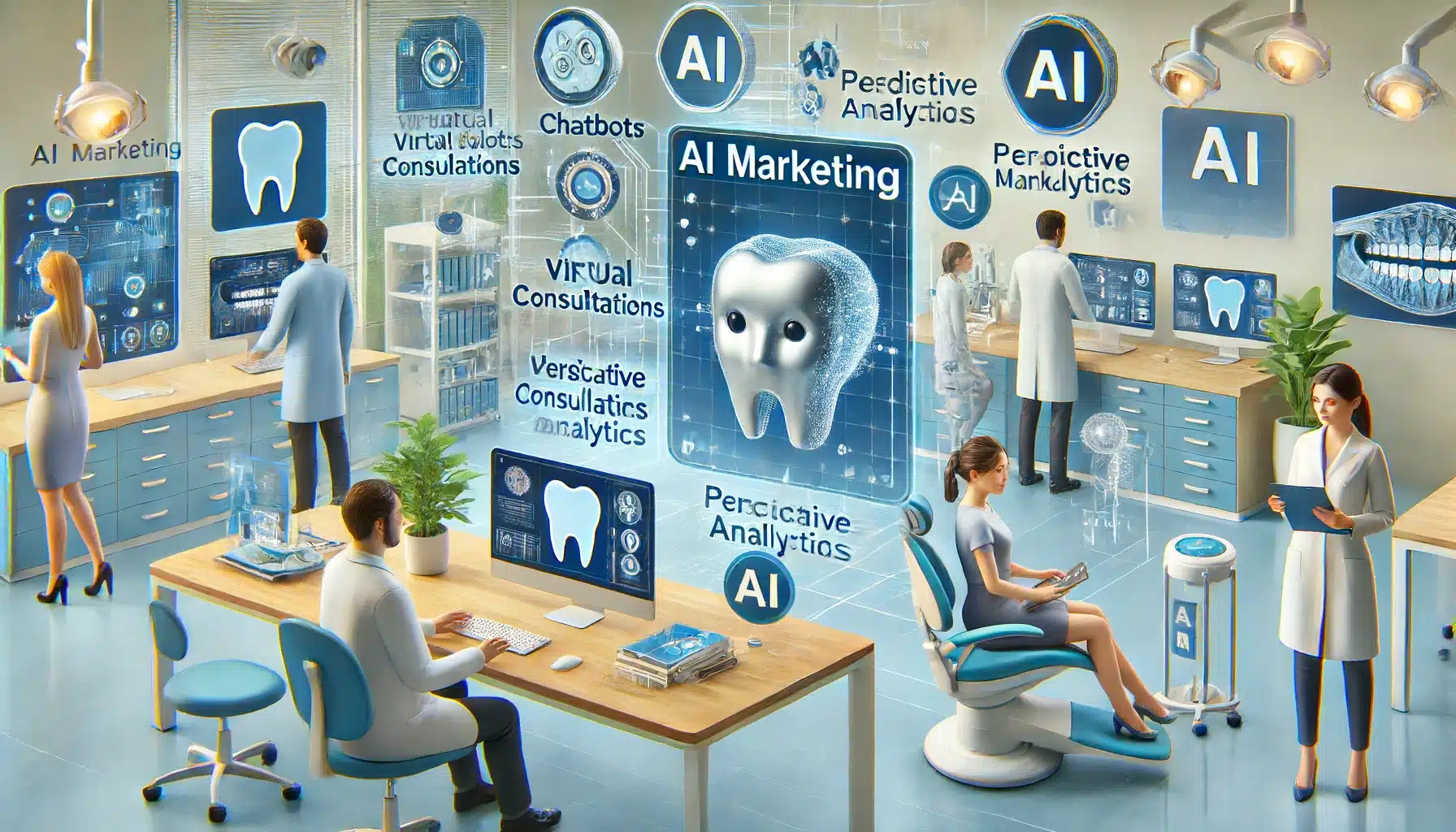Introduction
In the fast-evolving world of dentistry, marketing strategies have always played a crucial role in attracting and retaining patients. Historically, dental practices relied on traditional methods like print ads, word-of-mouth referrals, and basic digital marketing. However, these strategies often fell short in addressing the unique challenges of the dental industry. Today, AI marketing is revolutionizing the field, offering innovative solutions that enhance productivity and ROI.
Early Challenges in Dental Marketing
Limited Reach and Personalization
- Broad Targeting: Traditional marketing methods lacked the precision to target specific demographics effectively.
- Generic Messaging: Marketing messages were often too broad, failing to address individual patient needs and preferences.
Inefficiencies and Manual Processes
- Time-Consuming Tasks: Manual tasks such as appointment scheduling and follow-ups consumed valuable time.
- Data Management: Handling patient data and tracking marketing efforts was cumbersome and prone to errors.
Evolution and Advancements
With advancements in AI and machine learning, dental marketing has experienced a significant transformation. These technologies have introduced new ways to connect with patients, streamline operations, and improve overall efficiency.
Machine Learning and Predictive Analytics
- Data-Driven Insights: AI systems analyze large datasets to provide actionable insights into patient behaviors and preferences.
- Predictive Analytics: These tools forecast patient needs, enabling dentists to tailor their services and marketing strategies accordingly.
Current Trends in AI Marketing in Dentistry
AI marketing in dentistry is characterized by several innovative trends that are reshaping the industry.
Personalization and Targeting
- Customized Campaigns: AI algorithms analyze patient data to create personalized marketing campaigns that cater to individual needs and preferences.
- Behavioral Analysis: AI tools track patient behavior and progress to deliver targeted recommendations and interventions.
Example:
- Case Study: A dental practice implemented an AI-driven marketing campaign that personalized email content based on patient history and preferences. This approach resulted in a 30% increase in appointment bookings.
Enhanced Patient Engagement
- Chatbots and Virtual Assistants: AI-powered chatbots provide instant responses to patient inquiries, improving engagement and satisfaction.
- Virtual Consultations: AI enables the creation of virtual consultations, allowing dentists to connect with patients remotely.
Example:
- Case Study: An AI chatbot integrated into a dental practice’s website handled routine inquiries and appointment scheduling, reducing administrative workload by 40%.
Data-Driven Decision Making
- Patient Analytics: AI tools analyze patient data to provide real-time insights into patient progress, health trends, and the effectiveness of marketing strategies.
- Lead Scoring: AI systems score leads based on their likelihood to engage in dental services, helping practices prioritize their efforts.
Example:
- Case Study: Using AI-driven patient analytics, a dental clinic identified key trends in patient behavior, allowing them to refine their marketing strategies and improve patient retention rates.
Future Prospects of AI in Dental Marketing
The future of AI in dental marketing holds exciting possibilities, with advancements poised to further transform the industry.
Advanced Predictive Analytics
- Health Forecasting: AI will provide more accurate health forecasts, enabling dental professionals to anticipate patient needs and plan interventions.
- Service Customization: Enhanced predictive analytics will help dentists create more tailored services, improving patient outcomes.
Greater Integration with Wearable Technology
- Real-Time Health Monitoring: Integration with wearable devices will provide real-time data on patient health metrics, enhancing dental care strategies.
- Automated Feedback: AI and wearables will automate feedback, providing patients with instant insights and recommendations.
Augmented Reality (AR) and Virtual Reality (VR)
- Immersive Experiences: AR and VR technologies will offer more immersive dental experiences, helping patients visualize their treatment plans and outcomes.
- Virtual Procedures: AI-powered virtual procedures will allow patients to engage in guided dental sessions from home.
How AI Can Aid Dentistry and Improve Productivity and ROI
AI offers numerous benefits that can enhance productivity and ROI for dental practices.
Streamlined Operations
- Automation of Repetitive Tasks: AI automates routine tasks such as scheduling, data entry, and follow-ups, freeing up time for dental professionals to focus on high-value activities.
- Efficient Patient Management: AI-powered CRM systems help manage patient interactions more effectively, ensuring no opportunity is missed.
Example:
- Case Study: A dental practice implemented AI-driven scheduling software, reducing missed appointments by 25% and improving overall patient flow.
Enhanced Marketing Strategies
- Data-Driven Insights: AI provides insights into patient preferences and health trends, enabling dentists to tailor their marketing strategies for maximum impact.
- Targeted Campaigns: AI analyzes patient data to create highly targeted marketing campaigns, improving conversion rates.
Example:
- Case Study: An AI-powered marketing platform helped a dental clinic increase new patient acquisition by 40% through personalized social media campaigns.
Improved Patient Experience
- Personalized Interactions: AI personalizes patient interactions, providing a more engaging and satisfying experience.
- 24/7 Support: AI chatbots offer round-the-clock support, addressing patient inquiries and concerns promptly.
Example:
- Case Study: An AI chatbot integrated into a dental practice’s website handled routine inquiries and appointment scheduling, reducing administrative workload by 40%.
AI Tools for Dental Marketing
Several AI tools are revolutionizing dental marketing by enhancing efficiency and effectiveness.
AI-Powered CRM Systems
- Salesforce Health Cloud: This AI-driven CRM tool provides predictive analytics, lead scoring, and personalized recommendations for dental practices.
- HubSpot: HubSpot’s AI features include automated email marketing, lead nurturing, and data analytics tailored for dental marketing.
Chatbots and Virtual Assistants
- HealthJoy: HealthJoy’s AI chatbots engage patients in real-time, answering questions and providing health advice.
- Lifelink: Lifelink’s AI assistants follow up with patients, ensuring timely and personalized communication.
Virtual Consultation and Monitoring Tools
- Teledentix: Teledentix offers AI-powered virtual consultations, allowing dentists to connect with patients remotely.
- DentalMonitoring: DentalMonitoring provides AI-driven health monitoring and personalized dental programs.
Developing an AI Strategy for Dental Marketing
Implementing a successful AI strategy in dental marketing involves several key steps.
Identify Goals and Objectives
- Define Objectives: Clearly define what you aim to achieve with AI, such as improving patient engagement, enhancing health outcomes, or increasing revenue.
- Set Measurable Goals: Establish measurable goals to track the success of your AI initiatives.
Choose the Right Tools
- Evaluate Options: Research and evaluate different AI tools to determine which ones best meet your needs.
- Integration: Ensure that the chosen tools can be seamlessly integrated with your existing systems.
Train Your Team
- Training Programs: Provide comprehensive training programs to ensure your team understands how to use AI tools effectively.
- Ongoing Support: Offer ongoing support and resources to help your team stay updated with the latest AI advancements.
Automation in AI Marketing for Dentistry
Automation is a key component of AI marketing, offering numerous benefits for dental practices.
AI Blogging
- Content Generation: AI-powered tools can generate high-quality blog content, helping dental practices maintain an active online presence.
- SEO Optimization: AI tools optimize blog content for search engines, improving visibility and driving traffic to your website.
AI Website Automation
- Personalized User Experience: AI personalizes website content based on user behavior, providing a tailored experience for each visitor.
- Automated Updates: AI tools automatically update website content, ensuring it remains relevant and up-to-date.
Bot Automation
- Lead Qualification: AI chatbots qualify leads by engaging with website visitors and collecting relevant information.
- Patient Support: Chatbots provide instant support, addressing patient inquiries and resolving issues in real-time.
AI in Lead Generation for Dentistry
AI is transforming lead generation in dentistry, making it more efficient and effective.
Predictive Lead Scoring
- Analyzing Data: AI analyzes data from various sources to score leads based on their likelihood to engage in dental services.
- Prioritizing Efforts: Predictive lead scoring helps dental practices prioritize their efforts, focusing on the most promising leads.
Optimizing Ad Spend
- Behavioral Targeting: AI tracks user behavior to deliver targeted advertisements that resonate with potential patients.
- Cost Efficiency: AI tools optimize advertising budgets by targeting the right audience, reducing waste, and increasing ROI.
Example:
- Case Study: A dental clinic used AI-driven targeted advertising to reach potential patients interested in specific treatments, resulting in a 50% increase in click-through rates and a 20% decrease in cost per acquisition.
Q&A: Addressing Common Concerns
Q: How does AI personalize dental marketing? A: AI analyzes patient data to customize marketing campaigns, content, and interactions based on individual preferences and behaviors.
Q: What are the privacy concerns associated with AI in dentistry? A: Protecting patient data is paramount. Dental practices must ensure AI tools comply with data protection regulations and have robust security measures in place.
Q: How can dental practices be trained to use AI tools effectively? A: Comprehensive training programs and ongoing support are essential for dental teams to learn how to integrate and use AI tools effectively.
Conclusion
AI marketing is revolutionizing the dentistry industry by offering innovative tools and strategies to enhance productivity and ROI. By understanding the history, current trends, future prospects, and practical applications of AI in dental marketing, professionals can leverage these technologies to stay ahead of the competition. Embracing AI will not only improve operational efficiency but also provide a superior patient experience, driving long-term success in the dental market.


